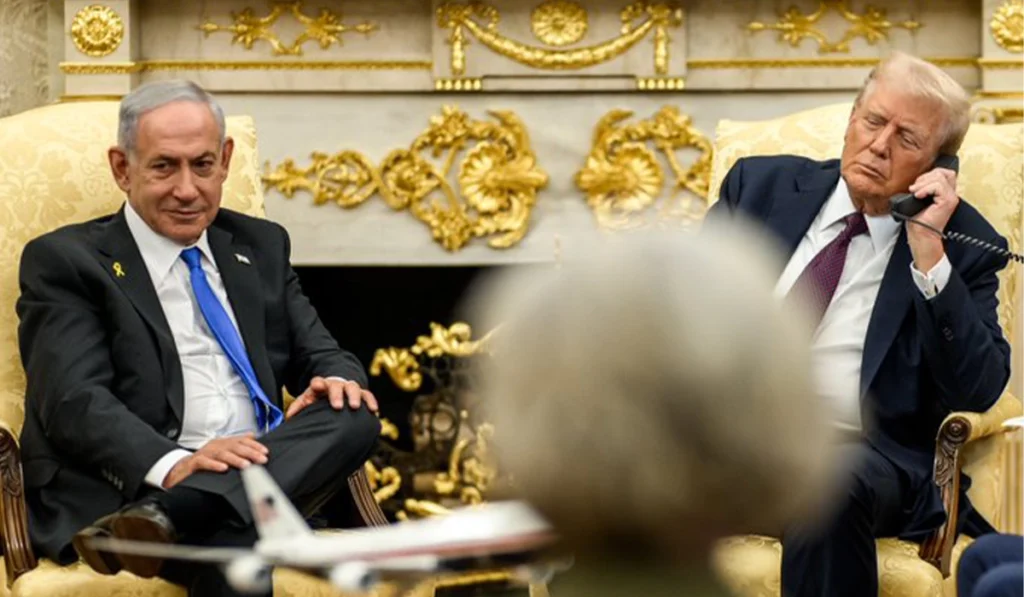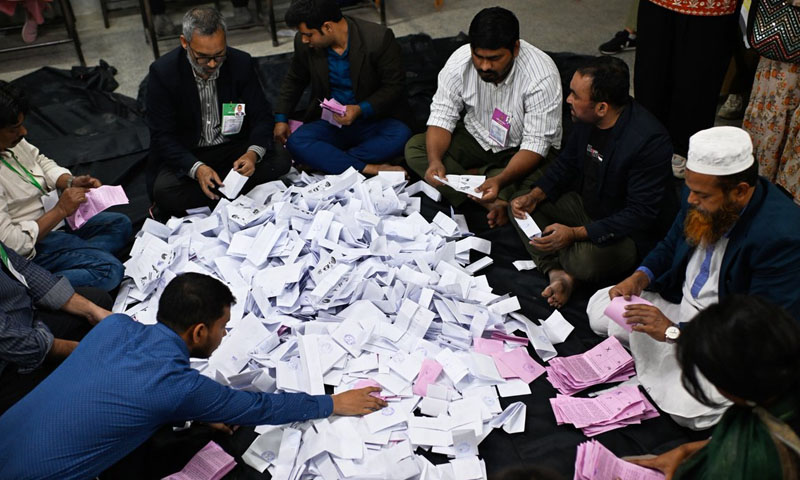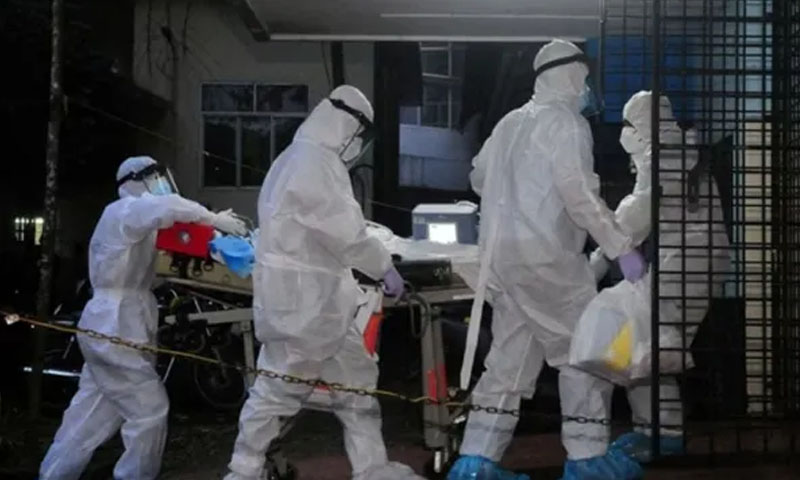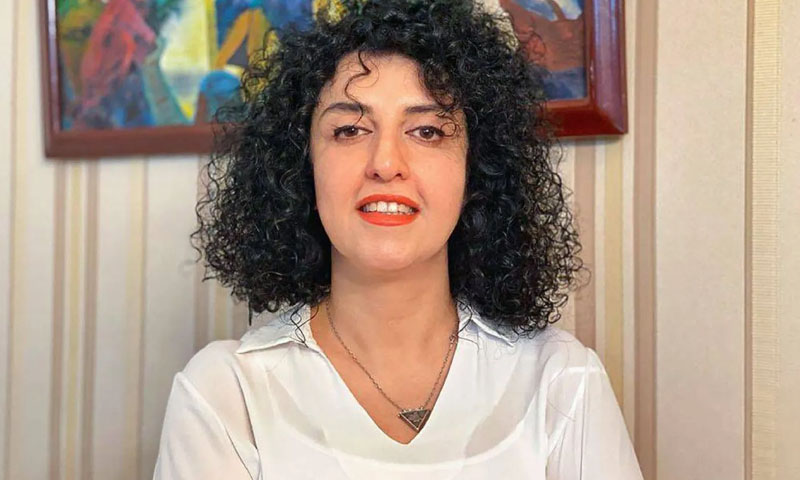- Web Desk
- 11 Hours ago
Netanyahu accepts Gaza peace plan, Trump says Pakistan backs it

WASHINGTON/DUBAI: Israeli Prime Minister Benjamin Netanyahu apologised to his Qatari counterpart for Israel’s attack in Doha during a telephone call from the White House on Monday, a source close to Netanyahu told Reuters, a report that the White House confirmed later and also shared the details of the Gaza peace plan.
The call to Qatari Prime Minister Sheikh Mohammed bin Abdulrahman al-Thani came as Netanyahu met with US President Donald Trump in Washington.
After the meeting, Trump and Netanyahu addressed a joint press conference where the US president thanked the Israeli prime minister for accepting the Gaza peace plan.
Read more: UNGA supports future Palestinian state but without Hamas
“I hope that we’re going to have a deal for peace, and if Hamas rejects the deal, which is always possible, they’re the only one left, everyone else has accepted it, but I have a feeling that we’re going to have a positive answer.”
Trump also mentioned that Prime Minister Shehbaz Sharif and Field Marshal Asim Munir had also supported the Gaza peace plan and added that all the Arab and Muslim states were supported the initiative.
His statement comes after Shehbaz on Monday expressed full support to the Gaza peace plan and said a peaceful resolution of the Palestine issue was “essential in bringing political stability and economic growth to the region”.
On Sunday, Jordan’s King Abdullah said many details of Trump’s plan were “in line with what has been agreed upon”, the Jordanian state news agency reported.
Read more: Trump Gaza plan details ‘in line’ with what has been agreed: Jordan
ABRAHAM ACCORDS
The US president said he believes Iran could join the Abraham Accords. “Who knows, maybe even Iran can get in there.”
“I think they’re going to be open to it. I really believe that. But they could be a member,” he added.
GAZA PEACE PLAN
Trump said the peace plan would involve the drawing up of a timeline for Israeli forces to withdraw from Gaza in phases.
“Working with the new transitional authority in Gaza, all parties will agree on a timeline for Israeli forces to withdraw in phases,” Trump told reporters, referring to a new body that would govern the Palestinian territory.
At the same time, Trump challenged Palestinians to “take responsibility for their destiny” by pushing for acceptance of a peace deal with Israel that he said would create conditions for a durable Israeli security.
“There are many Palestinians who wish to live in peace,” Trump said, adding, “I challenge the Palestinians to take responsibility for their destiny, because that’s what we’re giving them.”
“If the Palestinian Authority does not complete the reforms that I laid out … they’ll have only themselves to blame,” Trump added.
The peace plan states that on agreement by both sides, “the war will immediately end” with Israeli withdrawals timed to release of the last hostages held by Hamas. During that initial period, there would be a ceasefire.
Key points include deployment of a “temporary international stabilization force” and creation of a transitional authority headed by Trump.
The deal would demand Hamas fully disarm and be excluded from future roles in the government. However, those who agreed to “peaceful coexistence” would be given amnesty.
Following Israeli withdrawal, the borders would be opened to aid and investment.
Read more: China, Turkiye say Gaza belongs to Palestinians
In a crucial change from Trump’s earlier apparent goals, Palestinians will not be forced to leave and instead, the document said, “we will encourage people to stay and offer them the opportunity to build a better Gaza”.
‘TRILATERAL MECHANISM’
The White House issued a readout which said Trump “hosted a trilateral phone call” with the prime ministers of Israel and Qatar.
Netanyahu expressed regret for an Israeli attack in Doha to Qatar’s leader on Monday in a three-way call with Trump who “expressed his desire to put Israeli-Qatar relations on a positive track after years of mutual grievances and miscommunications”.
The two prime ministers, the White House said, “accepted the president’s proposal to establish a trilateral mechanism to enhance coordination, improve communication, resolve mutual grievances, and strengthen collective efforts to prevent threats”.
At a time when Trump is pushing for the Gulf States accepting the Abraham Accords, the readout read, “They underscored their shared commitment to working together constructively and clearing away misperceptions, while building on the longstanding ties both have with the United States.”
In this connection, the White House said Netayanhu, “as a first step”, “expressed his deep regret that Israel’s missile strike against Hamas targets in Qatar unintentionally killed a Qatari serviceman”.
Moreover, Netanyahu “expressed regret that, in targeting Hamas leadership during hostage negotiations, Israel violated Qatari sovereignty and affirmed that Israel will not conduct such an attack again in the future”.
In his response, “Thani welcomed these assurances, emphasizing Qatar’s readiness to continue contributing meaningfully to regional security and stability,” with Netanyahu expressing “commitment to the same”
According to the White House, the three leaders also “discussed a proposal for ending the war in Gaza, prospects for a more secure Middle East, and the need for greater understanding between their countries.”
“Trump praised both leaders for their willingness to take steps toward greater cooperation in the interest of peace and security for all,” the White House added.
NETANYAHU IN WHITE HOUSE
Trump hosted Netanyahu for pivotal talks on Monday to press him to back the Gaza peace plan aimed at ending a nearly two-year-old war that has seen Israel face growing international isolation.
In Netanyahu’s fourth visit since Trump returned to office in January, the right-wing Israeli leader was looking to shore up his country’s most important relationship after a slew of Western leaders formally embraced Palestinian statehood last week in defiance of the US and Israel.
Trump, who had sharply criticised the recognition moves as a prize to Hamas, was seeking Netanyahu’s agreement on a framework to end the war in the Palestinian territory and free the remaining hostages held by Hamas.
It marked a stepped-up diplomatic effort by a president who vowed during the 2024 presidential campaign to quickly bring the conflict to a close and has since repeatedly claimed that a deal was near, only for it to fail to materialise.
Washington presented the peace plan to Arab and Muslim states on the sidelines of the UN General Assembly last week, and Trump’s main objective on Monday was to try to close the remaining gaps with Netanyahu.
Read more: Muslim leaders for Gaza ceasefire, reconstruction, stabilisation
VERY CLOSE TO REACHING AN AGREEMENT
Earlier in the day, White House Press Secretary Karoline Leavitt said Israel and Hamas are “very close” to reaching agreement on a framework deal to end the war in Gaza and ensure lasting peace in the Middle East.
Leavitt, speaking on Fox News’ “Fox and Friends” programme, said Trump would discuss a 21-point peace plan with Israeli Prime Minister Benjamin Netanyahu at the White House later on Monday.
She added that Trump will also speak to leaders in Qatar, who have served as intermediaries with Hamas, on Monday.
“To reach a reasonable deal for both sides, both sides have to give up a little bit and might leave the table a little bit unhappy, but that is ultimately how we are going to end this conflict,” she said.
‘PEACEFUL COEXISTENCE’
The plan, crafted by US special envoy Steve Witkoff and Trump first-term Middle East adviser, Jared Kushner, envisions a ceasefire agreement followed by the release within 48 hours of all remaining hostages held by Hamas and the gradual withdrawal of Israeli forces from Gaza.
It also calls for a new dialogue between Israel and Palestinians for “peaceful coexistence” and no further Israeli attacks on Qatar, a White House official said on condition of anonymity. Israel angered Qatar, a US ally, and drew criticism from Trump for an airstrike against Hamas leaders in Doha on September 9.





